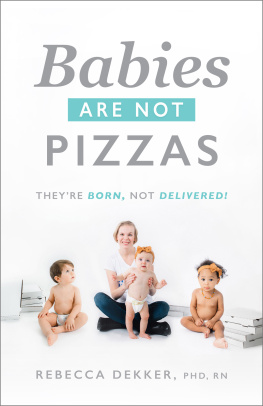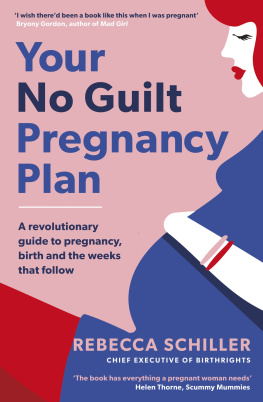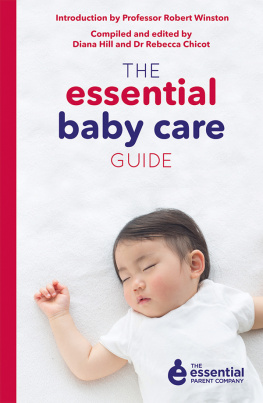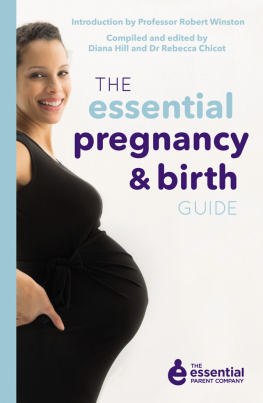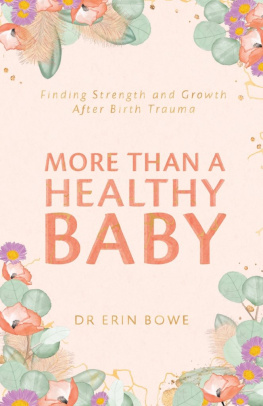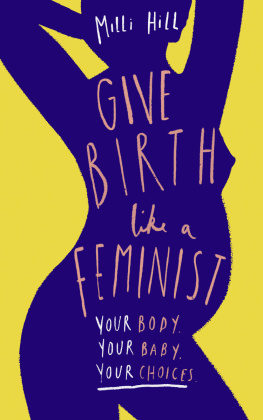
Babies Are Not Pizzas is a work of nonfiction. Some names, identifying details, and dates have been changed to protect the privacy of individuals.
Copyright 2019, 2020 by Evidence Based Birth
All rights reserved. No part of this book may be reproduced or distributed, in any manner whatsoever, without written permission, except in the case of brief quotations embodied in social media posts, critical articles, or reviews, and certain other noncommercial uses permitted by copyright law.
Evidence Based Birth is a registered trademark of Rebecca Dekker.
For information visit: https://evidencebasedbirth.com
For bulk orders, visit https://evidencebasedbirth.com/shop
Disclaimer: This information does not substitute for a care provider-patient relationship and should not be relied on as personal medical advice. Any information should not be acted upon without professional input from ones own healthcare provider.
Cover Photography by The Malicotes
Cover design by Angela Baxter
Book Cover design copyrighted by Evidence Based Birth
Typeset by Deborah Spencer
Edited by Cristen Pascucci and Rochelle Deans
ISBN-13: 978-1-7325496-4-7
10 9 8 7 6 5 4 3 2 1
Authors Note
T HIS BOOK IS NOT MEANT to advocate for one way of giving birth. The definition of evidence based care includes a) having research-based information to help you make decisions; b) finding a health care provider who can help you interpret that research evidence; and c) considering your own values, goals, and preferences. Since all of us are unique, there is no one right decision for everyone.
We each have our own birth story to tell. Some stories are empowering; others are traumatic; most are unforgettable. Some people feel that the hospital saved their lives. Others view themselves as victims of medical mistakes or unnecessary interventions.
This book contains my story.
Chapter One
NAIVE
I WENT INTO MY FIRST BIRTH with rose-colored glasses. I figured everything would be fine as long as I had a healthy pregnancywhich to me meant exercising and not gaining too much weight.
I had seen a few births back in nursing school, and I didnt want to be one of those patients they gossiped about at the nurses station. So, one of my main goals for this birth was for the nurses to like meespecially because I was giving birth at the hospital affiliated with the university where I was finishing my PhD in Nursingthe only place my student health insurance would permit me to give birth. I planned to listen to my health care providers and do as I was told.
I didnt do too much preparation. I read several popular pregnancy books, which, in retrospect, werent the best choices. Like the one-day hospital childbirth class my husband Dan and I took, the books seemed to send the message that we should passively accept everything that would be done to us during our hospital stay.
With only random bits of education, I was not prepared for what the system had in store for me. I laughed at birth plans. How can you possibly plan birth? Youre supposed to be flexible! You should do what your doctor saystheyre the one with the medical degree!
My only true desire was to have a vaginal birth, and maybe try to avoid pain medication for as long as possible because I am not a fan of needles.
Looking back, I realize I placed total control of my birth into the hands of the professionals who would be taking care of me. What I didnt know then is that if you give up total control of your decisions and dont do any education or planning, you often end up getting the lowest quality of health care, at the highest cost to yourself, your health, and your wallet.
Although I was oblivious about what I was headed toward, my younger sister by two-and-a-half years, Shannon, was really worried for me. Shannon was training to be a doctor in Michigan at the time, and she was witnessing all kinds of concerning situations on the labor and delivery unit. She noticed how many women were receiving totally unnecessary interventionslike medications given to speed up labor even when labor was progressing normally, or episiotomies or Cesareans being done because the physician was tired of waiting for the client to push the baby out. One time a resident told Shannon, Well, shes 4 centimeters now, so we are going to go break her water.
Why? Shannon asked.
Pause. Because thats what we do.
Feeling a bit like a two-year-old, Shannon again asked, Why?
Because it will make it go faster.
Why do we need it to go faster?
The resident grew more annoyed and brushed Shannon off. A few hours later, after finding all the research articles she could on PubMed, Shannon came back to the resident.
So, I was looking up this issue of rupturing membranes. It looks like it doesnt really make the first stage of labor go faster, and it can increase the risk of infection.
As you can probably guess, my sister was not the best-loved student on this rotation. But she did learn a lot about the culture of labor and delivery, and the need for change. Years later, she also told me, While training in obstetrics, I began to see that we, as doctors, can lie to our patients, and lie to ourselves, if we need to.
Given what she was seeing in the clinical setting, Shannon worried for me, but she didnt tell me horror stories, or preach at me, or tell me what to do. I remember one time, when we were on the phone, she asked some concerned questions about my childbirth preparation, but I brushed her off, saying, Dont worry about me, Ill be fine!
I really liked my OB. She was funny, nice, and smart. My husband and I both enjoyed our appointments with her, and she promised that she would be the one present at my birth. I didnt realize at the time how rare my situation was. What my OB offered at the time, and very few OBs practice today, is called continuity of carewhen the caregiver at your birth is the person youve been seeing throughout pregnancy. These days, most physicians, out of practical necessity, rotate call, meaning they take turns going to the hospital when someone is in labor. My OB practiced continuity of care with me, and thus she was present at a birth that, in the hands of one of the other OBs in her practice, might have easily become a Cesarean.
I was 39 weeks and 3 days into my pregnancy in the fall of 2008. I had been totally healthy, with the exception of my migraine headaches, which had worsened during pregnancy. Dan and I had finished watching a movie when, just before 11 p.m., my water broke. I felt this little pop and a tiny gush of water, like Id just barely wet my pants.
I think my water just broke, I exclaimed.
One of the instruction sheets we had been given said to go to the hospital if my water broke, so we started gathering our things. I took a quick shower and ate a big snack, knowing that I wouldnt be allowed to eat or shower once I got to the hospital. I was prepared to obey hospital policy without questionremember, I wanted to be a good patient. During our quick seven-minute drive to the hospital, my contractions started. They were easy to handle and coming 5 minutes apart.
Dan dropped me off at the hospital entrance and I made my way to triage alone while he parked the car. Triage is sort of a hospital holding area for patients coming in for birthnot used in all facilitieswhere people in labor can be assessed before being admitted. In triage, I was put on a narrow stretcher in a room with another patient, separated only by a curtain. There I was checked in by a nurse, physically examined (including my vagina), asked questions (the other patient could hear my answers), poked for an IV, and hooked up to monitors. During my time in triage, the OB resident took some fluid from my vagina, then hunched over a microscope with a medical student, examining the sample.
Next page
